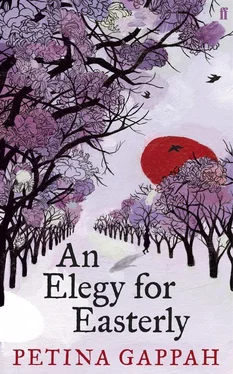He said, ‘Ah, masikati sister Chenai, please take this to Blandina,’ and thrust a blue aerogramme and a packet of Treetop sherbet into my hands.
The sherbet was for me, he said, and I ate it on the way home. Sisi Blandina laughed when she read the aerogramme and said, ‘ Haiwa , I have no time for such foolishness.’ She would not let me read it, but I knew that she would keep it in a shoebox that she kept at the bottom of our cupboard with the other letters that she received from Lalapanzi, and that night I sneaked into her box and read it.
‘My sweetheart Blandina,’ Mukoma George had written,
Time, fortune and opportunity have forced me to take up my hand to pen this missive to ask how are you pulling the wagons of existence and to tell you how much I love you. My heart longs for you like tea longs for sugar. I wish for you like meat wishes for salt, and I miss you like a postman would miss his bicycle. Truly, Blandina, you are my life, and I hope that you will be my wife. I want to send a messenger to Lalapanzi with any cows that your father asks as a bride price. I hope one day to be your ever-loving husband ,
George Simbarashe Gweme from Munyikwa
After that letter, Sisi Blandina lingered more and more with Mukoma George as she walked us back home from school. She now took all her Sundays off, she went away early in the morning, and then one Sunday she did not come back and that was the only time my mother ever had to shout at her. She made herself three new dresses on her sewing machine.
She talked less and less about the war.
‘Is Princess a nicer name than Rosemary?’ she said. ‘Do you like Precious or Prudence? What about George for a boy?’
When I said that she should ask Mukoma George if he liked it, she laughed and sang me another war song.
Then one day, just like that, she was gone.
She went for her Sunday off, and called my mother in the evening to say she would come for her clothes. She was getting married she said, she was going to elope to Mukoma George’s aunt’s house in Engineering. She came back to pack up her things, her sewing machine, and box of letters, and her three pairs of shoes, her pleated skirt with the cloth belt, her two blouses and her two-piece costume that my mother had given her, and the three dresses that she had made on her sewing machine. The only thing she left behind was the uniform dress and matching hat on her bare shelf in the middle of my wardrobe.

Three weeks after she left us, there was a clanging sound from our gate, and the dogs from next door barked at the sound and there was Sisi Blandina. She cried as she told my mother that George asked why it had taken so long for her to go to him if she was sure the child was his and anyway, George said, he had a girl in Munyikwa who was promised to him. Sisi Blandina told my mother that she told him he had deceived her and then he said he could not marry someone who was not a maiden and she said but he knew all the time because she told him about the camp in Mozambique and how she kept the guerrillas company and my mother said Blandina, and Sisi Blandina said but it was not my fault that is what we were told to do and my mother said ndine urombo Blandina, I feel pity, but you cannot stay here when things are like this, and Sisi Blandina wept and said, I have nowhere to go and my mother said you can go back to Lalapanzi and Sisi Blandina said oh God, my father, she said how will I face my father, and my mother said I can give you some money for the first few months but you cannot stay here and Sisi Blandina wept and stayed the night but left before I woke up the next morning and I never saw her again.

The police came to our house on the same day that my mother’s sister, my aunt from Gwelo, came to visit and they said that a woman had been taken out of the Mukuvisi River and did my parents know her because she had an aerogramme in her bag with our address on it. My father went with them and identified Sisi Blandina and he came back and told my mother. She cried and my aunt said to her, well, this is what happens when you try to help these girls and she said something about whores who slept with men to whom they were not married. Then she said to my father, really, these maids are all the same.
Mr Vaswani of Vaswani Brothers General Dealers was the first Indian that I saw closely enough to count the teeth in his mouth and the buttons on his shirt. I had seen Indians before; they were hard to miss, the women in fabrics of gossamer lightness, splashes of colour on Salisbury’s pavements, and, like their men, as brown as we but with hair that slipped and slithered like white people’s. Until I saw Mr Vaswani, I had never been close enough to them to see the colour of their irises.
Our school in Chitsa was closed because of the war so that my brother Danai and I were sent to Glen Norah Township in Salisbury to live with my mother’s younger sister, Mainin ’Juliana, who shared a house with their brother, our Sekuru Lazarus. We came to know all about Mainin ’Juliana’s Indian. She called him Mu India wangu , my Indian, shorthand for my Indian employer, to distinguish him from all the other Indians that were not Mr Vaswani. She worked in a shop in town that sold everything an African could possibly need, she said.
‘I stand behind the counter and help the shoppers,’ she told us. ‘And all he does is to stand there ordering me about. It is always Juliana you are wary, wary slow, and Juliana hurry up, hurry up because there are wary, wary many customers.’
Mainin ’Juliana argued with our neighbour’s daughter Susan, who worked in a white family’s house in the suburbs.
‘ Mu India wangu is a difficult man,’ said Mainin ’Juliana.
‘My white madam is more difficult,’ said Susan.
‘He waits until the last possible moment before paying our salaries.’
‘ Manje madam vangu lies in bed all day and smokes while I clean.’
‘He shouts at me, all day in my ear.’
‘She won’t let me eat any leftovers, imagine, her dog eats better than me. Ufunge , she even rides with her dog in front with her in the truck, and me in the back with all the sun and dust.’
‘He won’t advance me money to do my Pitman’s examinations. Just fifteen dollars, imagine.’
‘She won’t allow her husband to put electricity in the boy’s kaya , so I have to cook outside.’
‘He talks all day and sometimes won’t let me have my lunch.’
‘Madam vangu is too lazy even to wash her own underwear; I have to do it by hand.’
‘One of these days,’ vowed Mainin ’Juliana, ‘I am going to punch those spectacles off his nose.’

Danai and I decided that when we grew up, we would work for Mu India rather than the white madam. We spoke of him in one breath as Mu India waMainin ’Juliana, and talked of him as intimately as we did the members of our very large family, wondering at the peculiar singularity of his ways, his refusal to advance salaries even when there was illness in the family, his habit of picking his nose when he thought that no one was looking, the leftover Zambia cloth and bent out of shape Kango plates and cups with missing handles that he gave Juliana and his other assistant, Timothy, as Christmas bonuses, the yellow plastic comb that he tucked behind his ear and next to his hair, and his house in Belvedere, which we pronounced Bharabhadiya.
Читать дальше













